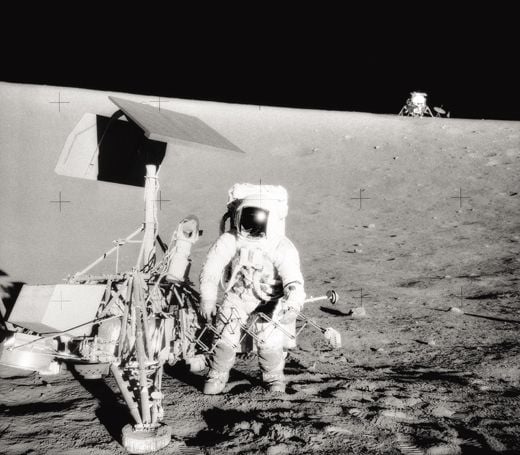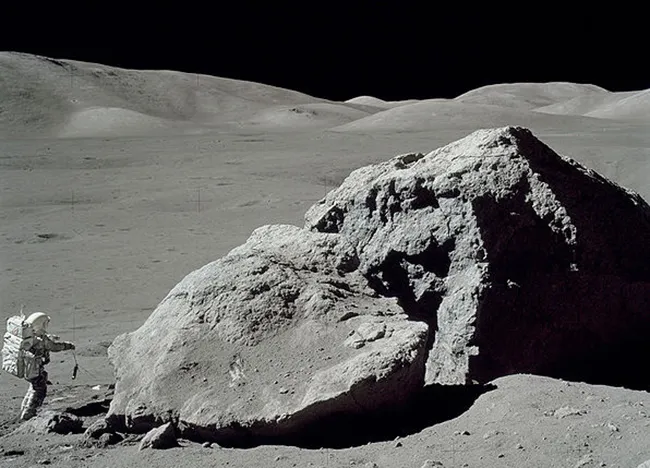The Real Reasons We Explore Space
Ambition, curiosity, and a reason the NASA Administrator admits has nothing to do with economic benefit.
/https://tf-cmsv2-smithsonianmag-media.s3.amazonaws.com/filer/89/e0/89e04b3e-49e0-4ca2-bb3c-881a6dc4aedd/596px-moon-apollo17-schmitt_boulder-1.jpg)
I am convinced that if NASA were to disappear tomorrow, if we never put up another Hubble Space Telescope, never put another human being in space, people in this country would be profoundly distraught. Americans would feel that we had lost something that matters, that our best days were behind us, and they would feel themselves somehow diminished. Yet I think most would be unable to say why.
There are many good reasons to continue to explore space, which most Americans have undoubtedly heard. Some have been debated in public policy circles and evaluated on the basis of financial investment. In announcing his commitment to send the country back to the moon and, later, on to Mars, President Bush quite correctly said that we do it for purposes of scientific discovery, economic benefit, and national security. I’ve given speeches on each of those topics, and these reasons can be clearly shown to be true. And presidential science advisor Jack Marburger has said that questions about space exploration come down to whether we want to bring the solar system within mankind’s sphere of economic influence. I think that is extraordinarily well put.
But these are not reasons that would make Americans miss our space program. They are merely the reasons we are most comfortable discussing. I think of them as “acceptable reasons” because they can be logically defended. When we contemplate committing large sums of money to a project, we tend to dismiss reasons that are emotional or value-driven or can’t be captured on a spreadsheet. But in space exploration those are the reasons—what I think of as “real reasons”—that are the most important.
When Charles Lindbergh was asked why he crossed the Atlantic, he never once answered that he wanted to win the $25,000 that New York City hotel owner Raymond Orteig offered for the first nonstop aircraft flight between New York and Paris. Burt Rutan and his backer, Paul Allen, certainly didn’t develop a private spacecraft to win the Ansari X-Prize for the $10 million in prize money. They spent twice as much as they made. Sergei Korolev and the team that launched Sputnik were not tasked by their government to be the first to launch an artificial satellite; they had to fight for the honor and the resources to do it.
I think we all know why people strive to accomplish such things. They do so for reasons that are intuitive and compelling to all of us but that are not necessarily logical. They’re exactly the opposite of acceptable reasons, which are eminently logical but neither intuitive nor emotionally compelling.
First, most of us want to be, both as individuals and as societies, the first or the best in some activity. We want to stand out. This behavior is rooted in our genes. We are today the descendants of people who survived by outperforming others. Without question that drive can be carried to an unhealthy extreme; we’ve all seen more wars than we like. But just because the trait can be taken too far doesn’t mean that we can do without it completely.
A second reason is curiosity. Who among us has not had the urge to know what’s over the next hill? What child has not been drawn to explore beyond the familiar streets of the neighborhood?
Finally, we humans have, since the earliest civilizations, built monuments. We want to leave something behind to show the next generation, or the generations after that, what we did with our time here. This is the impulse behind cathedrals and pyramids, art galleries and museums.
Cathedral builders would understand what I mean by real reasons. The monuments they erected to the awe and mystery of their God required a far greater percentage of their gross domestic product than we will ever put into the space business, but we look back across 600 or 800 years of time, and we are still awed by what the builders accomplished. Those buildings, therefore, also stand as monuments to the builders.
The return the cathedral builders made on their investment could not have been summarized in a cost/benefit analysis. They began to develop civil engineering, the core discipline for any society if it wishes to have anything more than thatched huts. They gained societal advantages that were probably even more important than learning how to build walls and roofs. For example, they learned to embrace deferred gratification, not just on an individual level, where it is a crucial element of maturity, but on a societal level, where it is equally vital. The people who started the cathedrals didn’t live to finish them. The society as a whole had to be dedicated to the completion of those projects. We owe Western civilization as we know it today to that kind of thinking: the ability to have a constancy of purpose across years and decades.
It is my contention that the products of our space program are today’s cathedrals. The space program satisfies the desire to compete, but in a safe and productive manner, rather than in a harmful one. It speaks abundantly to our sense of human curiosity, of wonder and awe at the unknown. Who can watch people assembling the greatest engineering project in the history of mankind—the International Space Station—and not wonder at the ability of people to conceive and to execute the project? And it also addresses our need for leaving something for future generations.
Of course the space program also addresses the acceptable reasons, and in the end this is imperative. Societies will not succeed in the long run if they place their resources and their efforts in enterprises that, for whatever reason, don’t provide concrete value. But I believe that projects done for the real reasons that motivate humans also serve the acceptable reasons. In that sense, the value of space exploration really is in its spinoffs, as many have argued. But it’s not in spinoffs like Teflon and Tang and Velcro, as the public is so often told—and which in fact did not come from the space program. And it’s not in spinoffs in the form of better heart monitors or cheaper prices for liquid oxygen for hospitals, although the space program’s huge demand for liquid oxygen spurred fundamental improvements in the production and handling of this volatile substance. The real spinoffs are, just as they were for cathedral builders, more fundamental.
Anyone who wants to build spacecraft, who wants to be a subcontractor, or who even wants to supply bolts and screws to the space industry must work to a higher level of precision than human beings had to do before the space industry came along. And that standard has influenced our entire industrial base, and therefore our economy.
As for national security, what is the value to the United States of being involved in enterprises which lift up human hearts everywhere? What is the value to the United States of being a leader in such efforts, in projects in which every technologically capable nation wants to take part? The greatest strategy for national security, more effective than having better guns and bombs than everyone else, is being a nation that does the kinds of things that make others want to do them with us.
What do you have to do, how do you have to behave, to do space projects? You have to value hard work. You have to live by excellence, or die from the lack of it. You have to understand and practice both leadership and followership. You have to build partnerships; leaders need partners and allies, as well as followers.
You have to accept the challenge of the unknown, knowing that you might fail, and to do so not without fear but with mastery of fear and a determination to go anyway. You have to defer gratification because we work on things that not all of us will live to see—and we know it.
We now believe that 95 percent of the universe consists of dark energy or dark matter, terms for things that we as yet know nothing about. Is it even conceivable that one day we won’t learn to harness them? As cavemen learned to harness fire, as people two centuries ago learned to harness electricity, we will learn to harness these new things. It was just a few years ago that we confirmed the existence of dark matter, and we would not have done so without the space program. What is the value of knowledge like that? I cannot begin to guess. A thousand years from now there will be human beings who don’t have to guess; they will know, and they will know we gave this to them.

